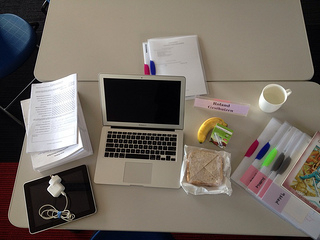As the mother of three, I’ve had the experience of engaging with two different school boards, three schools, and a great number of support, teaching and administrative personnel over the past 10 years. Although I’m trying to write this post with my parent hat on (the woolly one that keeps me warm in hockey arenas!), I recognize that I have a certain personal bias with regards to education given my experience as a teacher and as someone who unabashedly loves learning. Walking into a school, any school, doesn’t cause me angst. If fact, it has the opposite effect, it makes me feel alive and excited. Sadly, this isn’t the case for every parent. I remember my first round of parent-teacher interviews at a large urban high school in Gatineau. I was certainly nervous as the novice teacher on staff but not anywhere close to as agitated and uncomfortable as some of the parents who came to see me! I can only guess why some of them felt the way they did (their own emotional connection and experience with formal schooling, their child’s academic performance, etc.), but what I do know is that once I connected with them, for the most part, they seemed to feel better about the whole process. Imagine if I had been able to communicate with them efficiently and effectively on a daily basis, demystifying for them what was actually happening in my class and at school.
We all know that it’s important for schools to communicate with parents. Why? Because study after study has shown that student achievement is positively impacted by parent involvement. (You may want to check out some of the specific research on the benefits here.) And, involvement hinges on good, regular communication. One or two meetings a year and the odd letter or note home just doesn’t cut it for me anymore. I want to know what my kids are up to…daily. How can this be accomplished without over-tasking the already heavily tasked school teachers, administrators & support staff? Well, here are some suggestions. One caveat, this list is not research driven, nor does it reflect everybody’s digital reality, but it does come from the heart…the heart of a sometimes frustrated but always enthused parent:
A school website. I’m really not looking for anything fancy or complicated here, just a site that is updated regularly and includes the most current contact information for all the go-to people in the school. The professional email addresses of all the teaching staff would be greatly appreciated. A monthly calendar with important dates would be nice too. How about PDF’s of important documents, along with the school newsletter? And maybe even links to all of the school’s class blogs and social media? A one-stop shop of sorts that would bundle together many of the communication modes listed below. There are some very easy to use, free websites out there (see Weebly or Google Sites) that don’t require a tech specialist to build or update.
An e-newsletter. At my son’s high school, the daily newsletter, which gets read to the students during advisory, is sent out to any parent who has an email and wishes to receive it. My middle son’s school physically sends a newsletter out monthly which they also post on their school website. Both of these strategies work for me. I get to see what extracurriculars or meetings are taking place and am reminded of important dates, so that I can in turn help the school and my children by reinforcing this information at home.
Class blogs. I’m not sure that I can express in mere prose my love of class blogs…I may have to write a song about it! (What rhymes with blogs?) The teachers who have taken the time to set up and grow these precious sites should be lauded. Not only do they themselves benefit by being able to reflect more openly on their own practice and make more transparent what and how they are teaching, the students (and by extension the parents) have easy access to what used to be buried in a teacher’s planner. In some cases, the students take ownership for the content creation on the blog and it becomes a sort of portfolio of their work. For some great examples of class blogs and how they are used in a myriad of amazing ways, check out the Edublog Awards here.
Personal Learning Networks (PLN’s) Okay, this may be a stretch…but I don’t think so. A PLN is an informal learning network whereby a person makes connections (on the interwebs) with other people, with the intent of learning something, or contributing to common professional development. Being a parent of school-aged children is more than a full-time job! Why not help parents support each other by putting them in contact with each other or by providing the means for them to connect more easily? The introduction of simple online tools like Google docs for sports team carpooling or SignUpGenius for fundraising initiaves, are easy ways to tap into the power of parent crowd sourcing.
Email. I know that this may seem obvious but I have received many first week hard copy communications from teachers with no indication of how or when to contact them should I so desire. Remember, I really do understand how busy you are but I want to know that you are available, and if email isn’t your communication channel of choice, I need to know what is.
The Phone (or Skype, or videoconferencing). When a physical face-to-face just isn’t possible or a written missive just won’t do. Yes, randomly calling somebody is pretty hit-and-miss and can be a time-waster but a pre-arranged phone or video conference which best suits the availability of teacher and parent is, to me, every bit as satisfying as meeting in person, and often much more convenient.
Hard Copies. Inkjet printers, photocopy machines…all technologies…though not my preferred form for the purposes of efficient, regular or time-sensitive communication. I do understand the necessity, however, of sometimes sending documents home that need to be signed or authorized. Why not make the most of these opportunities? How about sending home a short parent survey at the beginning of the year to solicit information from parents about how they want to be involved in the life of the school? For more great ideas on forging parent partnerships, check out some of Dr. Joe Mazza’s insightful posts on Edutopia or listen to one of his interviews about using technology to engage families here.
The onus of establishing and fostering good communication between school and parents does not fall exclusively on the school. In my mind, parents bear the greatest responsibility for taking ownership of their children’s education but sometimes need help feeling comfortable doing so. If I don’t hear from or meet a teacher directly within the first weeks of school…I reach out. Just a quick email to let the teacher know how much I appreciate the very important work that he/she is doing and that I’m always available to discuss the progress (or lack thereof!) of one of my children.
What are some of the ways that you or your school keep parents in the loop and engaged?






